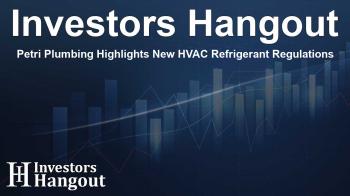Petri Plumbing Highlights New HVAC Refrigerant Regulations

Introduction to New HVAC Refrigerant Regulations
As we navigate changing regulations within the HVAC industry, one key update stands out: the transition to A2L refrigerants. Petri Plumbing, Heating, Cooling & Drain Cleaning, a business with a history stretching back to 1906, advises homeowners contemplating new HVAC system installations to consider these new refrigerants. This regulatory shift offers not only compliance benefits but also enhancements in energy efficiency and environmental protection.
The Mandate for A2L Refrigerants
In a significant move, all air conditioning units and heat pumps manufactured after January 1, 2025, will be required to utilize A2L refrigerants. This change, mandated by federal regulations, reflects a broader commitment to reducing greenhouse gas emissions and improving energy efficiency. According to Michael Petri, the owner of Petri Plumbing, this adjustment is beneficial for both homeowners and the environment.
The Benefits of A2L Refrigerants
A2L refrigerants, such as R-32 and R-454B, are identified not only for their efficiency but also for their reduced environmental impact. They promise less greenhouse gas emissions compared to older refrigerant types, such as R-410A. Switching to an HVAC system utilizing A2L refrigerants could yield energy savings ranging from 20% to 40% on annual cooling costs, highlighting the financial benefit as well.
Considerations for Homeowners
Homeowners contemplating a new HVAC system must weigh their options carefully. While it is technically permissible to install systems that use older refrigerants until January 1, 2026, Petri encourages homeowners to invest in modern systems as soon as possible to avoid challenges with refrigerant availability in the future. As older refrigerants are phased out, sourcing replacement refrigerant may become problematic, potentially leading to costly repairs.
Preparing for the Transition
The HVAC industry has been gearing up for these changes since the enactment of the American Innovation and Manufacturing Act. This proactive stance is vital for ensuring compliance and continued service availability for homeowners. As the deadline approaches, HVAC professionals are strategizing how best to educate and assist their clients during this transition.
Petri Plumbing Fire, Heating, Cooling & Drain Cleaning is committed to guiding homeowners through this change, emphasizing the importance of selecting modern HVAC systems that accommodate the new refrigerants for enhanced performance and sustainability.
Making an Informed Decision
When considering the installation of a new HVAC system, out-of-date models that utilize older refrigerants could become a liability. Homeowners should actively seek out energy-efficient options that employ A2L refrigerants. Not only does this represent compliance with upcoming regulations, but it also contributes to a greener future.
Petri Plumbing offers extensive services in HVAC systems, ensuring that installations are performed with the latest technology while maintaining high-quality service standards. With upfront pricing and a commitment to customer satisfaction, Petri Plumbing looks to foster trust and reliability among its clients.
About Petri Plumbing, Heating, Cooling & Drain Cleaning
Petri Plumbing, Heating, Cooling & Drain Cleaning has been at the forefront of home service solutions since 1906. This family-owned business takes pride in providing top-notch plumbing, heating, and cooling services, ensuring that all clients receive a 100% satisfaction guarantee. As experts in the field, Petri guarantees accurate installations, reliable repairs, and maintenance for various home systems.
For more information about services or to schedule an appointment, homeowners can contact Petri Plumbing directly.
Frequently Asked Questions
What are A2L refrigerants?
A2L refrigerants are a new classification of refrigerants that are more environmentally friendly and efficient, designed to replace older refrigerants that are being phased out.
Why should I replace my old HVAC system?
Older HVAC systems may use outdated refrigerants, which won't be available in the future. Additionally, newer systems are more energy-efficient and can significantly reduce your energy costs.
What is the deadline for new HVAC systems to use A2L refrigerants?
All air conditioning and heat pump units manufactured after January 1, 2025, must use A2L refrigerants.
Can I still install an older HVAC system?
While you can still install systems that use older refrigerants until January 1, 2026, it is advisable to invest in newer technology that complies with upcoming regulations.
Where can I get more information about my HVAC options?
Consult with local HVAC professionals like Petri Plumbing, Heating, Cooling & Drain Cleaning, who can guide you in selecting the most efficient and compliant system for your home.
About Investors Hangout
Investors Hangout is a leading online stock forum for financial discussion and learning, offering a wide range of free tools and resources. It draws in traders of all levels, who exchange market knowledge, investigate trading tactics, and keep an eye on industry developments in real time. Featuring financial articles, stock message boards, quotes, charts, company profiles, and live news updates. Through cooperative learning and a wealth of informational resources, it helps users from novices creating their first portfolios to experts honing their techniques. Join Investors Hangout today: https://investorshangout.com/
Disclaimer: The content of this article is solely for general informational purposes only; it does not represent legal, financial, or investment advice. Investors Hangout does not offer financial advice; the author is not a licensed financial advisor. Consult a qualified advisor before making any financial or investment decisions based on this article. The author's interpretation of publicly available data shapes the opinions presented here; as a result, they should not be taken as advice to purchase, sell, or hold any securities mentioned or any other investments. The author does not guarantee the accuracy, completeness, or timeliness of any material, providing it "as is." Information and market conditions may change; past performance is not indicative of future outcomes. If any of the material offered here is inaccurate, please contact us for corrections.
